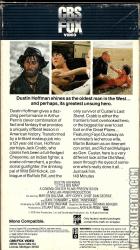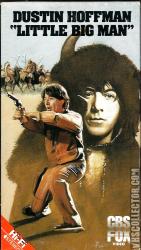Little Big Man
Catalog Number
7130
-
Primary Distributor (If not listed, select "OTHER")
Catalog Number
7130
Primary Distributor (If not listed, select "OTHER")
Release Year
Country
N/A (NTSC)
N/A | N/A | N/A
N/A | N/A
Little Big Man (1970)
Additional Information
Additional Information
Either The Most Neglected Hero In History Or A Liar Of Insane Proportion!
Little Big Man Was Either The Most Neglected Hero In History Or A Liar Of Insane Proportion!
Recounting how the West was won through the eyes of a white man raised as a Native American, Arthur Penn's 1970 adaptation of Thomas Berger's satirical novel was a comic yet stinging allegory about the bloody results of American imperialism. As a misguided 20th-century historian listens, 121-year-old Jack Crabb (Dustin Hoffman) narrates the story of being the only white survivor of Custer's Last Stand. White orphan Crabb was adopted by the Cheyenne, renamed "Little Big Man," and raised in the ways of the "Human Beings" by paternal mentor Old Lodge Skins (Chief Dan George), accepting non-conformity and living peacefully with nature. Violently thrust into the white world, Jack meets a righteous preacher (Thayer David) and his wife (Faye Dunaway), tries to be a gunfighter under the tutelage of Wild Bill Hickock (Jeff Corey), and gets married. Returned to the Cheyenne by chance, Jack prefers life as a Human Being. The carnage wreaked by the white man in the Washita massacre and the lethal fallout from the egomania of General George A. Custer (Richard Mulligan) at Little Big Horn, however, show Crabb the horrific implications of Old Lodge Skins' sage observation, "There is an endless supply of White Men, but there has always been a limited number of Human Beings.
Little Big Man is a 1970 American revisionist Western directed by Arthur Penn and based on the 1964 comic novel by Thomas Berger. It is a picaresque comedy about a white boy raised by the Cheyenne nation during the 19th century. The film is largely concerned with contrasting the lives of American pioneers and Native Americans throughout the progression of the boy's life.
The movie stars Dustin Hoffman, Chief Dan George, Faye Dunaway, Martin Balsam, Jeff Corey and Richard Mulligan. It is considered a revisionist Western, with Native Americans receiving a more sympathetic treatment and the United States Cavalry depicted as villains.
Despite its satirical approach, the film has tragic elements and a clear social conscience about prejudice and injustice. Little Big Man is considered an example of anti-establishment films of the period, protesting America's involvement in the Vietnam War by portraying the U.S. military negatively.
Little Big Man received widespread acclaim from film critics. It is among AFI's 400 movies nominated to be on their list of America's greatest 100 movies[6] Review aggregator Rotten Tomatoes reports that 96% out of 25 professional critics gave the film a positive review, with a rating average of 7.9/10.[7]
In his December 15, 1970 review, Vincent Canby of The New York Times called the movie, "Arthur Penn's most extravagant and ambitious movie, an attempt to capture the essence of the American heritage in the funny, bitter, uproarious adventures of Jack Crabb."[8] Roger Ebert, of the Chicago Sun-Times, agreed, giving the film four stars out of four stars, and describing Little Big Man as "an endlessly entertaining attempt to spin an epic in the form of yarn.
Release Date: December 14, 1970
Distrib: National General Pictures
Boxoffice: $31,559,552 2013: $163,906,100
Little Big Man Was Either The Most Neglected Hero In History Or A Liar Of Insane Proportion!
Recounting how the West was won through the eyes of a white man raised as a Native American, Arthur Penn's 1970 adaptation of Thomas Berger's satirical novel was a comic yet stinging allegory about the bloody results of American imperialism. As a misguided 20th-century historian listens, 121-year-old Jack Crabb (Dustin Hoffman) narrates the story of being the only white survivor of Custer's Last Stand. White orphan Crabb was adopted by the Cheyenne, renamed "Little Big Man," and raised in the ways of the "Human Beings" by paternal mentor Old Lodge Skins (Chief Dan George), accepting non-conformity and living peacefully with nature. Violently thrust into the white world, Jack meets a righteous preacher (Thayer David) and his wife (Faye Dunaway), tries to be a gunfighter under the tutelage of Wild Bill Hickock (Jeff Corey), and gets married. Returned to the Cheyenne by chance, Jack prefers life as a Human Being. The carnage wreaked by the white man in the Washita massacre and the lethal fallout from the egomania of General George A. Custer (Richard Mulligan) at Little Big Horn, however, show Crabb the horrific implications of Old Lodge Skins' sage observation, "There is an endless supply of White Men, but there has always been a limited number of Human Beings.
Little Big Man is a 1970 American revisionist Western directed by Arthur Penn and based on the 1964 comic novel by Thomas Berger. It is a picaresque comedy about a white boy raised by the Cheyenne nation during the 19th century. The film is largely concerned with contrasting the lives of American pioneers and Native Americans throughout the progression of the boy's life.
The movie stars Dustin Hoffman, Chief Dan George, Faye Dunaway, Martin Balsam, Jeff Corey and Richard Mulligan. It is considered a revisionist Western, with Native Americans receiving a more sympathetic treatment and the United States Cavalry depicted as villains.
Despite its satirical approach, the film has tragic elements and a clear social conscience about prejudice and injustice. Little Big Man is considered an example of anti-establishment films of the period, protesting America's involvement in the Vietnam War by portraying the U.S. military negatively.
Little Big Man received widespread acclaim from film critics. It is among AFI's 400 movies nominated to be on their list of America's greatest 100 movies[6] Review aggregator Rotten Tomatoes reports that 96% out of 25 professional critics gave the film a positive review, with a rating average of 7.9/10.[7]
In his December 15, 1970 review, Vincent Canby of The New York Times called the movie, "Arthur Penn's most extravagant and ambitious movie, an attempt to capture the essence of the American heritage in the funny, bitter, uproarious adventures of Jack Crabb."[8] Roger Ebert, of the Chicago Sun-Times, agreed, giving the film four stars out of four stars, and describing Little Big Man as "an endlessly entertaining attempt to spin an epic in the form of yarn.
Release Date: December 14, 1970
Distrib: National General Pictures
Boxoffice: $31,559,552 2013: $163,906,100
Related Links
Related Releases1
Catalog Number
7130
Primary Distributor (If not listed, select "OTHER")
Little Big Man (1970)
Release Year
Catalog Number
7130
Primary Distributor (If not listed, select "OTHER")
Catalog Number
7130










Comments0
Login / Register to post comments